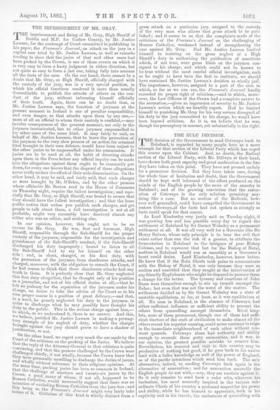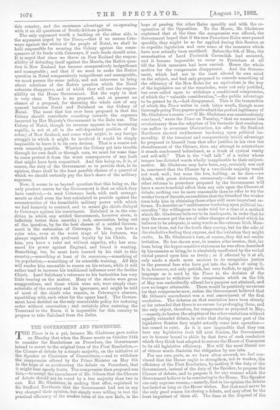THE ZULU DECISION.
THE decision of the Government to send Cetewayo back to Zululand, is regarded by many people here as a mere triumph for that section of the Liberal Party which has urged this course upon the Cabinet. And, no doubt, the Radical section of the Liberal Party, with Mr. Dillwyn at their head, have shown both great sagacity and great moderation in the line they have taken on this point. They have not pressed unduly for a premature decision. But they have taken care, during the whole time of hesitation and doubt, that the Government should be kept well informed of the effect produced on the minds of the English people by the news of the anarchy in
Zululand ; and of the growing conviction that the restor- ation of Cetewayo is the only solution promising any- thing like a cure. But no section of the Radicals, how- ever well generalled, could have compelled the Government to restore Cetewayo,sif the facts had not spoken as strongly as facts could speak for that course.
As Lord Kimberley very justly said on Tuesday night, it was growing less and less possible every day to regard the settlement of Zululand by Sir Garnet Wolseley as a permanent settlement at all. It was all very well for a Governor like Sir Henry Bulwer, whose only principle is to bear the evil that exists rather than run the risk of a greater, to attribute the fermentation in Zululand to the intrigues of poor Bishop Colenso, and to represent that but for the Bishop of Natal, matters in Zululand would run as smoothly as a Governor's heart could desire. Lord Kimberley, however, knew better. He knew that if the Zulu Chiefs took pains to communicate with the Bishop of Natal, it was only because they were so restless and unsettled that they caught at the intervention of any friendly Englishman who might be disposed to procure them a change for the better. The tyranny and exactions of John Dunn were themselves enough to stir up tumult amongst the Zulus ; but even that was not the worst of the matter. The settlement decided on by Sir Garnet Wolseley was a state of unstable equilibrium, so far, at least, as it was equilibrium at all. No man in Zululand, in the absence of Cetewayo, had either sufficient influence or sufficient ability to prevent the others from quarrelling amongst themselves. Rival king- lets, none of them permanent, though one of them had suffi- cient tincture of the craft of civilisation to make almost all the others resent his superior cunning, could never continue to reign in the immediate neighbourhood of each other without con- stant quarrels. Cetewayo alone had authority and ability enough to overrule these petty animosities, and it was,, in our opinion, the greatest possible mistake to remove him. Nevertheless, his removal and visit to this country may be productive of nothing but good, if he goes back to his native land with a fuller knowledge as well of the power of England, as of the pacific intentions which send him back. The only alternative, indeed, to sending Cetewayo back again is the alternative of annexation ; and for annexation assuredly the English people do not wish,—nay, they are resolute against it. So it only remains to send back a ruler who, whatever his barbarism, has most assuredly inspired in the various sub- ordinate Chiefs of his country a profound respect for his power and ability, while he has learned to appreciate, both in his captivity and in his travels, the uselessness of quarrelling with.
this country, and the enormous advantage of co-operating with it on all questions of South-African politics.
The only argument worth a farthing on the other side, is the argument urged by the Times,—that if we restore Cete- wayo against the wishes of the people of Natal, we shall be held responsible for securing the Colony against the conse- quences of its feuds with Cetewayo, if such feuds should arise. It is urged that since we threw on New Zealand the respon- sibility of defending itself against the Maoris, the Native ques- tion in New Zealand has become comparatively insignificant and manageable ; and that if we want to make the Native question in Natal comparatively insignificant and manageable, we must pursue the same policy, and not intervene to bring about solutions of the Native question which the Natal colonists disapprove, and of which they will cast the respon- sibility on the Home Government. But the reply to that is very clear. There is no proposal, and at present no chance of a proposal, for throwing the whole cost of any quarrel between Natal and Zululand on the Colony of Natal. The most that has ever been proposed is that the Colony should contribute something towards the expenses incurred by Her Majesty's Government in the Zulu war. The Colony of Natal, though its revenue appears to be increasing rapidly, is not at all in the self-dependent position of the colony of New Zealand, and come what might, in any foreign struggle in which it might be involved it would be simply impossible to leave it to its own devices. That is a course not even remotely possible. Whether the Colony got into trouble through its own fault or through ours, we must for some time to come protect it from the worst consequences of any fault that might have bedn committed. And this being so, it is, of course, the duty of the Government so to provide that, in its opinion, there shall be the least possible chance of a quarrel of which we should certainly pay the lion's share of the military expenses.
Now, it seems to us beyond question that this being so, the only prudent course for the Government is that on which they have resolved,—to send Cetewayo back, with such arrange- ments as shall seem the best calculated to provide against the reconstruction of the formidable military power with which we had formerly to contend, and to secure the chiefs disloyal to Cetewayo against his resentment. Zululand is in the con- dition in which any settled Government, however stern, is infinitely better than anarchy ; and, annexation being out of the question, by far the best chance of a settled Govern- ment is the restoration of Cetewayo. In him, you have a ruler who, even at the worst stage of his fortunes, was always regarded with profound loyalty by his Chiefs. In him, you have a ruler not without sagacity, who has mea- sured his power against England, and found it wanting. Something, too, he must have learned by his visit to this country,—something at least of its resources,—something of its population,—something of its scientific training. All this will render him amenable to reason on his return, while it will rather tend to increase his traditional influence over the feebler Chiefs. Lord Salisbury's reference to his barbarities has very little bearing on the matter. Many of the stories were gross exaggerations, and those which were not, were simply char- acteristic of the country and its ignorance, and might be told of most of the chiefs who remain, in Cetewayo s absence, squabbling with each other for the upper hand. The Govern- ment have decided on the only conceivable policy for restoring order without annexation ; and certainly after restoring the Transvaal to the Boers, it is impossible for this country to propose to take Zululand from the Zulus.































 Previous page
Previous page